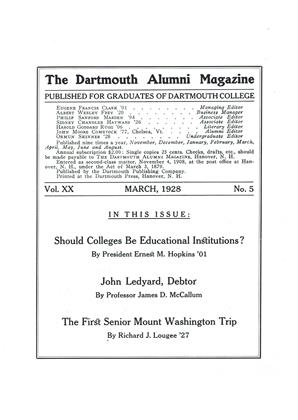Because editorials in the students' newspaper, The Dartmouth, have advocated the abolition of nationally affiliated fraternities at Hanover in favor of purely local clubs without evoking a roar of protest from the alumni of the College, the editors of that excellent journal appear to have assumed that the alumni are either calmly indifferent to the proposal or incline positively to approve it. That is a very unsafe assumption. Out of the several thousand graduates of Dartmouth now living who are members of national fraternities, it is improbable that very many have so much as known about the proposition; and the few who have known about it may assume this to be one more vagary of undergraduate editors, which probably is not widely shared among active delegations in the fraternities now in college.
With a somewhat more intimate acquaintance of the situation, the editors of this MAGAZINE confess that they also doubt the universality of the revolt. Sev eral epistolary students have lent the support of their pens to the Dartmouth's suggestion, but nothing that we are aware of indicates either that the project has been thought out carefully to its logical sequels, or that it commands any general backing among active fraternity men. That the alumni would muster about 100 to one in disapproving it we can readily believe to be true. That the present fraternity delegations will view the matter in a clearer light if they wait a few years in order to estimate the usefulness of national affiliations from more adequate data seems entirely certain.
It would be well for undergraduates to consider very soberly what would be the ultimate result of secession from the national organizations known by cabalistic Greek letters, in order to form campus clubs of what are described as "likeminded" students. Those results are like ly to be more important and less agreeable than one appreciates at first sight. In any case, to quote from Rabbi BenEzra, "Youth sees but half" in such a problem. It is familiar with the fraternity question only as a purely local issue. Of the part which national fellowships may play in later life, it is impossible for the undergraduate to know anything save by hear-say from his elders, who are held in more or less contempt as the products of a creed outworn. One would prefer a considered opinion from men who have experienced both estates—that of the undergraduate and that of the alumnus—as likely to be based on better grounds.
It is perhaps unfortunate that alumni have so limited an opportunity of expressing their views on such matters. One or two have written letters to TheDartmouth, and one or two to the ALUMNI MAGAZINE; but the great bulk of the alumni remain, and in the nature of things will continue to remain, inarticulate. This is not a purely undergraduate question and should not be misconceived as such by the students now in college. There are two aspects to it, as to but one of which the present student has adequate personal knowledge and experience.
It would be fair, however, for alumni to reveal evidences of an open mind in facing the argument for abolition—the more so because there is small indication of real openness of mind in those who rush eagerly to demand a change. It is far from true that there is nothing to be said for secession from the national bodies, even though it may seem to older eyes that there is still not enough to be said to justify so radical an alteration. Times have changed, and the part played by fraternities differs from that of 30 years ago, beyond doubt. It would be well to assess the changes soberly and see whether or not an alumni view squaring with that of the student advocates is reasonable. All one asks is recognition of the fact that while one is still in college the national aspect of the fraternities cannot be fully appraised, any more than the altered conditions now obtaining can be appraised by those who have been for two or three decades out of college.
 View Full Issue
View Full Issue
More From This Issue
-
 Article
ArticleSHOULD COLLEGES BE EDUCATIONAL INSTITUTIONS?
March 1928 By President Ernest Martin Hopkins -
 Class Notes
Class NotesClass of 1899
March 1928 By Louis P. Benezet -
 Class Notes
Class NotesClass of 1899
March 1928 By Louis P. Benezet -
 Class Notes
Class NotesClass of 1927
March 1928 By Doane Arnold -
 Lettter from the Editor
Lettter from the EditorCOMMUNICATIONS
March 1928 -
 Class Notes
Class NotesClass of 1918
March 1928 By Frederick W. Cassebeer








